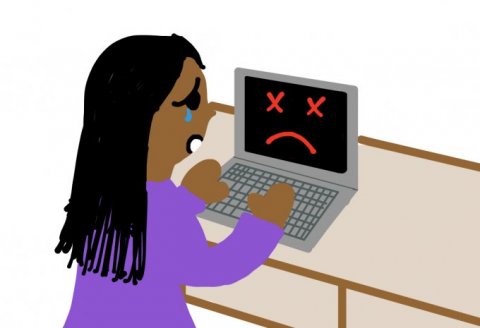Submitted by Mayuri Raja on

Drawn by me to convey my feelings upon finding out that I had single-handedly ruined a perfectly good laptop
As the title suggests, I was met last week with the unfortunate reality that my computer, after six years of chugging along, had finally met its demise by my hand.
Yes, you read that right. I killed my computer— accidentally, of course. Last week, on Thursday, I decided to try and update my computer’s operating system. My computer was dual booted to run two operating systems, Windows and Ubuntu (I can feel the judgment already). I was trying to update my Ubuntu operating system to a newer version, but for some reason, it wouldn’t allow the update to occur because I had non-native packages installed. In the process of deleting unnecessary packages from my computer, I somehow managed to delete a vital package. Suddenly, there was no way for me to close any of the windows I had open or to switch between windows, and the keyboard wasn’t responding. Deciding there was nothing else I could do, I restarted my computer, but now, I couldn’t even log in to Ubuntu. Even after opening a terminal, I was unable to fix what I had done.
So naturally, I decided that the next step was, with nothing to lose, to wipe my Ubuntu partition clean and install the Ubuntu update manually. I made a bootable USB drive and began the installation, overwriting the Ubuntu partitions. However, when I restarted the computer, the bootloader couldn’t find my Windows partition, nor could it find my newly installed Ubuntu OS. Panicked, I tried to restart my computer without the USB drive, and I was met with a terrifying sight— my computer couldn’t find any operating systems. I had lost everything.
The first lesson you learn as a CS major is that you want to save backups of your backups of your work. Well, I hadn’t followed this basic piece of advice that I had heard echoed over and over again. I hadn’t backed up my files in over a year, and I hadn’t even backed up all of them at that point. I had no idea how many things I’d lost with my hard drive in such a dubious state. I spent about four hours frantically trying a different combination of tactics to revive my computer to its former state, and then I gave up, declared it dead, and went to sleep, trying not to think about how much data I had lost.
Surprisingly, over the next few days, I found that life without a computer wasn’t that hard. The amount of work I could get done just using my phone— sending emails, coordinating group meetings, almost anything web-based— was impressive. In addition, I have an iPad that I usually use for taking notes (and drawing the pictures for these blog posts!), and I found that in most cases, my iPad could easily replace my laptop. I realized that I don’t actually use my laptop all that much for schoolwork; if anything, I mostly use my laptop for writing that I do for fun. I do most of my coding in the computer labs now, so I didn’t lose any of my computer science work, and almost all of my other classwork is on Google Drive. The reality is that none of the files I lost were super important.
Of course, it has felt pretty silly to walk around without a computer as a computer science major. I can’t do any coding without going to the GDC labs, which means I can’t code without people around anymore. Luckily, I don’t have a bunch of coding this semester, but it has been difficult to do web-based homework on websites that have horrible mobile layouts or require Flash to work. I might feel incomplete, but at the end of the day, the wonders of saving files to the cloud and operating mostly through web-based apps is that I didn’t lose anything important and my day-to-day life hasn’t been hindered.
Of course, I don’t intend to stay computer-less forever, because at some point, I’m going to need my own machine that I can code on, whether it be for research or interviews. So what have I learned from this? First, the cloud is a wonderful invention and I am thankful for it. Second, don’t mess around with your computer without saving your files and creating backup drives. Third, I don’t actually use my computer that much. And fourth, if you tell your lab supervisor that the reason you missed a deadline is because you wiped your own hard drive, he will laugh at you, but he won’t be mad.
I hope you don’t destroy your own computer, and make sure to back up your work always!







